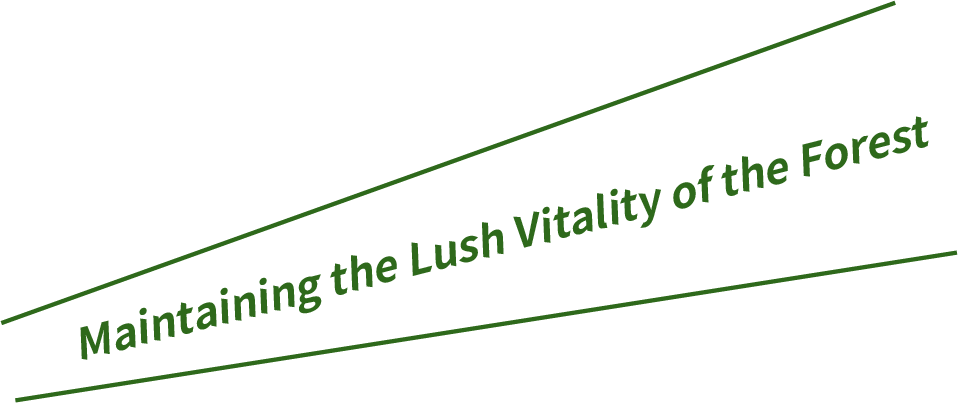
The forest ranger oversees everything in the mountains. Despite the heavy workload, Chen Mei-Yen, a Pangcah person from Taipei, tends to the forests with energy and passion every day because she sees Hualien as her hometown.
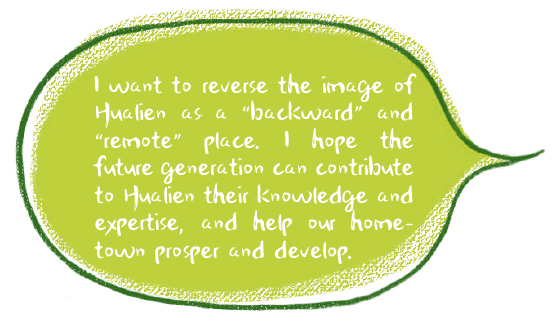

Have you ever been chased by a boar? Forest ranger Chen Mei-Yen once encountered a mother boar with piglets. The boar pants fast and loudly at the sight of human and runs toward Chen with her tusks revealed. Chen felt the hair on her back stand up and ran with all her might without thinking twice, only when she steered well clear of the boar did she finally feel safe. Other than the boar, she has also been attacked by hornets. But none of the dangers ever stopped her love for this job. Chen believes that the perk of being a forest ranger is spending all her time with nature, and co-existing with different creatures. It is her duty to maintain the balance of the ecology.
Born and raised in Taipei, Chen has never adapted to the fast pace of the city and has always yearned for Hualien, where she used to spend her childhood vacations. To her recollection, the sky of Hualien was always crystal clear, and you could see paddy fields right downtown. She has fond memories of exploring the paddy fields with her cousin. “I felt my pressure relieved whenever I see greenery and wondered how much better life would be living in Hualien.” Chen grew very tired of her work in the city, and long harbored the idea of leaving it all behind.
In 1980s, in response to the enactment of the Indigenous Peoples Employment Rights Protection Act, job openings for indigenous peoples were released by Motor Vehicles Offices and Departments of Environmental Protection throughout Taiwan. Originally working at the Motor Vehicles Office, Chen noticed that Hualien Forest District Office had job openings. She immediately applied for a transfer, and finally returned to her long-desired Hualien in 1995.
Loving Her Job
However Tough It May Be
Turning on her radio and GPS, Chen begins her work with fully energy every day. She oversees the area south to Baibao River and north to Shuhu River, measuring a total of 1,278 hectares. Overseeing forestation and tending, supervising, clearing garbage, patrolling to prevent deforestation, removing of alien species, reward forestation verification, inspecting the mines, and stakeout, her job reaches far and beyond. “Going deep into the mountains or putting out forest fires would be the men’s job, but work that requires communication, such as promoting local training or policies, women tend to have a much better result,” says Chen.
Although the workload is heavy and tedious, Chen still has a lot of fun. The forest is an open area, many people illegally occupy roadside areas and charge accordingly, so they must record the process in disguise to obtain evidence of such crime. “Once I received a complaint that a parking lot was charging people against the rules, so I put on my flip-flops and wandered around pretending that I was a tourist shopping for food.” Even though she found it funny thinking back to it, Chen also shares with graveness, “but we do work here on a regular basis, and they all recognize us. Sometimes we are afraid that they will get back at us for interfering with their business, after all, we’re out in the open and they’re not.”
In addition to such violations, it is also the forest ranger’s duty to address illegal mining. The area Chen oversees covers the Feng-Tien mine, although now shut down, the jade stone inside is still extremely valuable and targeted by many illegal miners. Upon receiving a report, the forest ranger must stakeout the route the illegal miners might take leaving the mountains and examine the tire marks after the vehicles pass through, measure the weight of the vehicle to determine whether or not there could have been illegal mining going on. The process is challenging but Chen enjoys it very much, “every mission teaches me something new.”
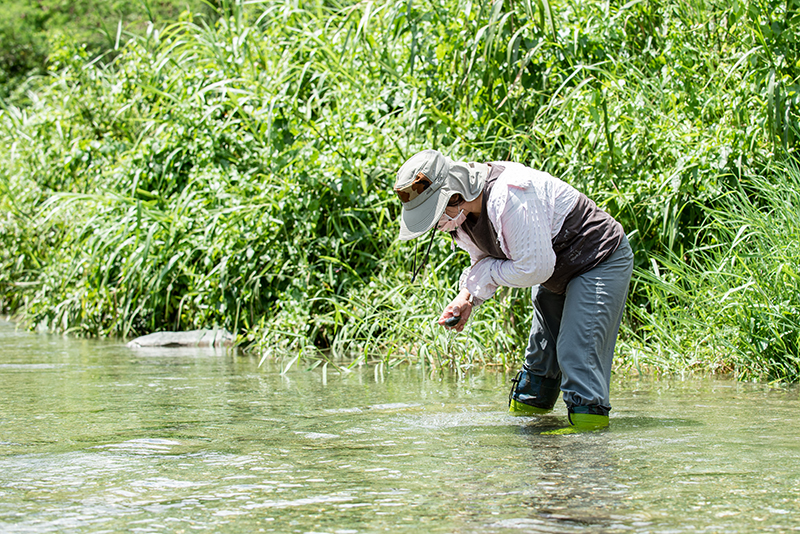

Forest rangers not only patrols the mountains, surveying fishes in the creeks is also part of their daily job.
It Takes the Entire Community
to Build the Ecology
Once populated with paddy fields, Hualien downtown is now filled with buildings instead, with Shoufeng remaining the last paradise. Chen feels deeply the importance of environmental conservation and says with assertiveness, “biodiversity is our only way out, we must preserve the original environment.”
With a pair of binoculars, Chen would stand under the blazing sun and survey the impounding reservoir, searching for signs of Sacred Ibis, an alien bird species. The area surrounding Li Chuan Aquafarm, which is known for its Golden Clam, and Huaike Bridge, face issues of alien bird species gathering and pillaging food, forcibly occupying the habitat of waterfowls including egret and Black-crowned Night Heron. In response, the Forest District Office activated the Alien Species Removal Program, enlisting the help of hunters in Dowmung Community to search and remove alien species. “It takes the entire community to build the ecology.” Chen believes that combing public and private forces and getting the communities to work together, they can effectively increase the awareness of local environmental protection and realize sustainable ecological development.
For example, forest engineering in the early years largely involved cement, cutting of the water way of Lao River, destroying natural habitats, and leading to the extinction of various species. The Forest District Office now uses local material to build fishways, facilitating the spawning migration of fishes while monitoring the migration effect of the fishways, and regularly inspecting the number of fish species. Furthermore, the Forest District Office work with indigenous communities to promote the Satoyama Initiative, building man-made trails with environmental-friendly methods and materials, maintaining the biodiversity and resource balance. Chen shares with delight, “the birds and dragonflies have all returned, the environment is slowly resuming its former glory.”
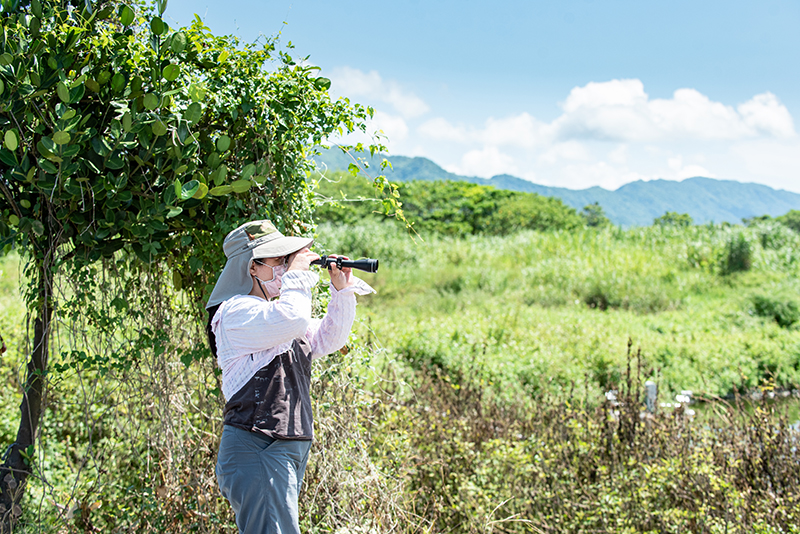
Chen monitoring alien bird species
Bring Back the Youth and Work
to Revitalize the Communities
Not only the environment, but indigenous communities also require revitalization. Rinahem Community sits in the area Chen oversees, where the elders could sing beautiful traditional songs, yet the youth is nowhere to be seen. The younger generation is essential to passing on the traditional songs, yet to bring them back, there must be incentives of steady jobs.
To facilitate the under-forest economy, the Forestry Bureau promotes shiitake cultivation on logs in Rinahem Community, with forest rangers tutoring and aiding the residents. But it’s not east to cultivate shiitake in the mountains. You need to first build a storage reservoir and connect the pipes, and to “wake up the shiitake”, the logs must be flipped to hit the ground repeatedly. It is labor-intensive and the youth are not willing to continue such work. Falas, the former chairperson of Guangrong Community Development Association in Shoufeng Hualien, aged 60, says that even though the cost has yet to be recovered, he is still willing to lead in building local economy. He believes that only when the local indigenous population are willing to invest will the youth be willing to return home.
“If the youth returns, they can help protect the rivers and fishes, and develop in-depth community tourism for indigenous communities.” Chen believes that the younger generation is quick to learn and filled with creativity, they can integrate local resources to develop the community, “I want to reverse the image of Hualien as a ‘backward’ and ‘remote’ place. I hope the future generation can contribute to Hualien their knowledge and expertise, and help our hometown prosper and develop.”
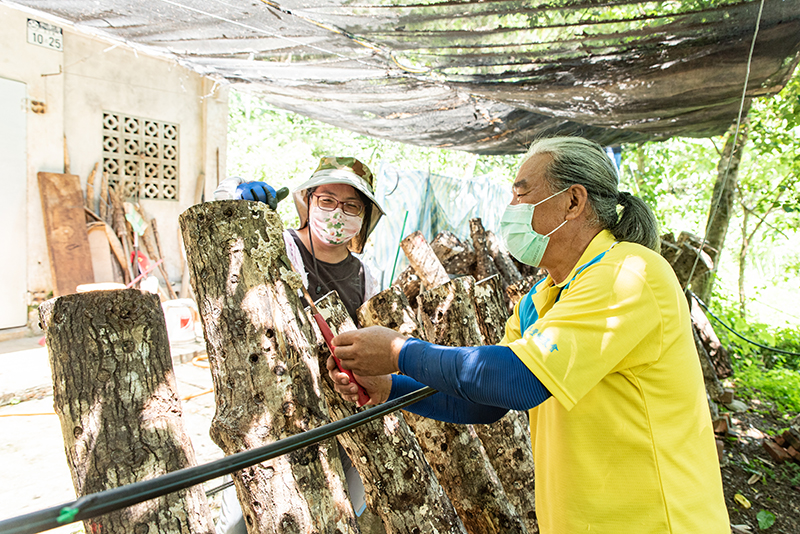
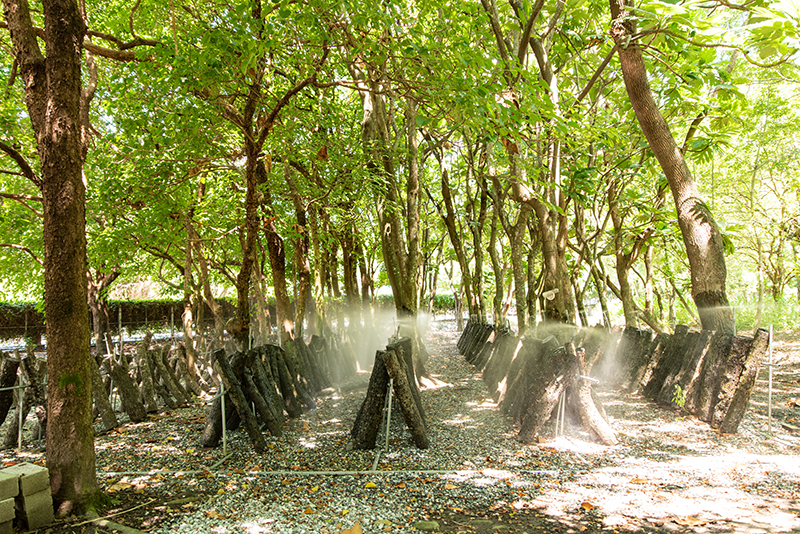
Chen tutoring local communities to cultivate shiitake on logs to promote under-forest economy




